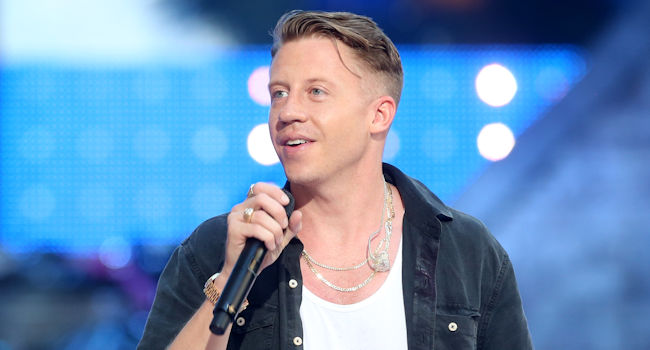
“Acceptance” is a complex term for Macklemore. On one hand, he has been accepted in the most difficult barrier to breach in hip-hop — the Momsmobile. Meanwhile, the guardians of his own genre reject his family-friendly, bubble-gum image.
There’s a sector of hip-hop — mostly hardcore fans — who won’t blink at a new release from the Seattle emcee. His latest single, “White Privilege II,” is not for them.
As a single for the upcoming album This Unruly Mess I’ve Made, “White Privilege II” is for Macklemore fans — the ones who will pay for and download it minutes after it’s on iTunes without second thought. It’s for the people who think he is the only good thing in rap. It’s for the fictional mom he meets in the restaurant halfway through the song who has kids who recite his lyrics. But it’s not what his fans want to hear.
Macklemore won’t be suddenly accepted with open arms by hip-hop with one track, but “White Privilege II” is the exact first step he needed to take in gaining the respect of his peers while taking an ambitious swing at a white-hot topic from an unrepresented perspective in the battle for equality— the white person who wants to help.
With this single, Macklemore is acting as a double agent for the Black Lives Matter movement. Macklemore’s character is the perfect disguise for a message too rooted in hate for a black rapper to convey with as much impact.
Whites may be minority in the hip hop genre, but Macklemore is anything but when it comes to the charts and mainstream appeal, putting him in rarified air as a hip-hop artist. The mastermind behind pro-penny-pinching “Thrift Shop” and LGBT anthem “Same Love” has been accepted in the family rooms of middle-class white America, which is a feat for any rapper, regardless of their color.
As he notes in “White Privilege II,” Macklemore had been using pieces of black culture — hip hop — to his advantage to build a career. “You’ve taken the drums and the accent you rapped in…That Grandmaster Flash’d go slap it, you bastard.” It was not until the Grammys when he saw the true power of Macklemore’s racial relativity, stealing physical hardware from Kendrick Lamar, a more deserving musician simply because his music was more palatable to the well-off Grammy voters.
Macklemore had good intentions with his innocent songs of acceptance and frugality, but to hardcore hip-hop, he came off more naïve than sincere. Macklemore had no problems enjoying his newfound fame, but every time he walked on stage in a $5 fur coat, the less likely it seemed he would ever be embraced by the genre he was misrepresenting.
Rap is a great platform to convey unconventional ideas, but when a rich white rapper gloats about ironically shopping in a thrift store (when, you know, there are people who shop there because it falls within their means), his messages ring hollow.
Taking a page from 8 Mile character B-Rabbit’s defense strategy, Macklemore all but forces his acceptance in the genre by laying all of the truths on the table. He calls his style of rap “pop bullsh*t,” a pimped-out version of the music Grandmaster Flash originated that builds the walls of his house to keep people out. Macklemore is embracing the artist he is, and in turn, embracing the power he has over the white perspective and reach that a black artist is not yet able to obtain.
The Seattle MC has taken on social issues in the past, but LGBT rights and shoe brand-shaming are relatively low-hanging fruit for a musician that looks more like a former Backstreet Boy than a rapper. Macklemore’s Eminem in a parallel universe: a white rapper that white America easily identifies with because of his skin color, albeit subconsciously. While Eminem was fiercely rejected by suburbia because of his outrageous content, Macklemore is given free rein into these same ears.
“My skin matches the hero, likeness, the image,
America feels safe with my music in their systems
And it’s suited me perfect, the role, I’ve fulfilled it,
And if I’m the hero, you know who gets cast as the villain”
The Heist MC isn’t the first artist to spread a positive message in his music. So why is Kendrick Lamar shunned by mainstream media for his uplifting “Alright” performance on BET while Macklemore is able to go as far as to wed same-sex couples at the Grammys?
Macklemore is recognizing a divide in American culture. Not full-blown racism, but the subconscious acceptance of those who are our likeness simply because we cannot identify with the issues those who don’t look like us. This mindset an invisible, moving target that no one has tried to take a shot at before the release of “White Privilege II.”
“This is coming from a real place,” he told Sway in the Morning, referring to the first verse in which he tries to join a Black Lives Matter protest. “That’s me now knowing if this is actually benefitting anybody.”
Macklemore’s concerns are genuine — is his presence at such a rally contributing to the cause? Or diverting cameras away from the real movement? The average white citizen won’t have to worry about drawing droves of cameras, but they deal with the same conflict of whether their support for these causes is genuine or rooted deeper in self-satisfaction and attention.
Being so deeply rooted — even founded — on escape from racial divide, hip-hop will be at the front lines of this exhausting battle for equality. Macklemore’s admission of privilege won’t change all of America’s mindset with a few beats and rhymes, but if he so much opens the idea for change in the minds of a few, his latest single will be his best to date.






